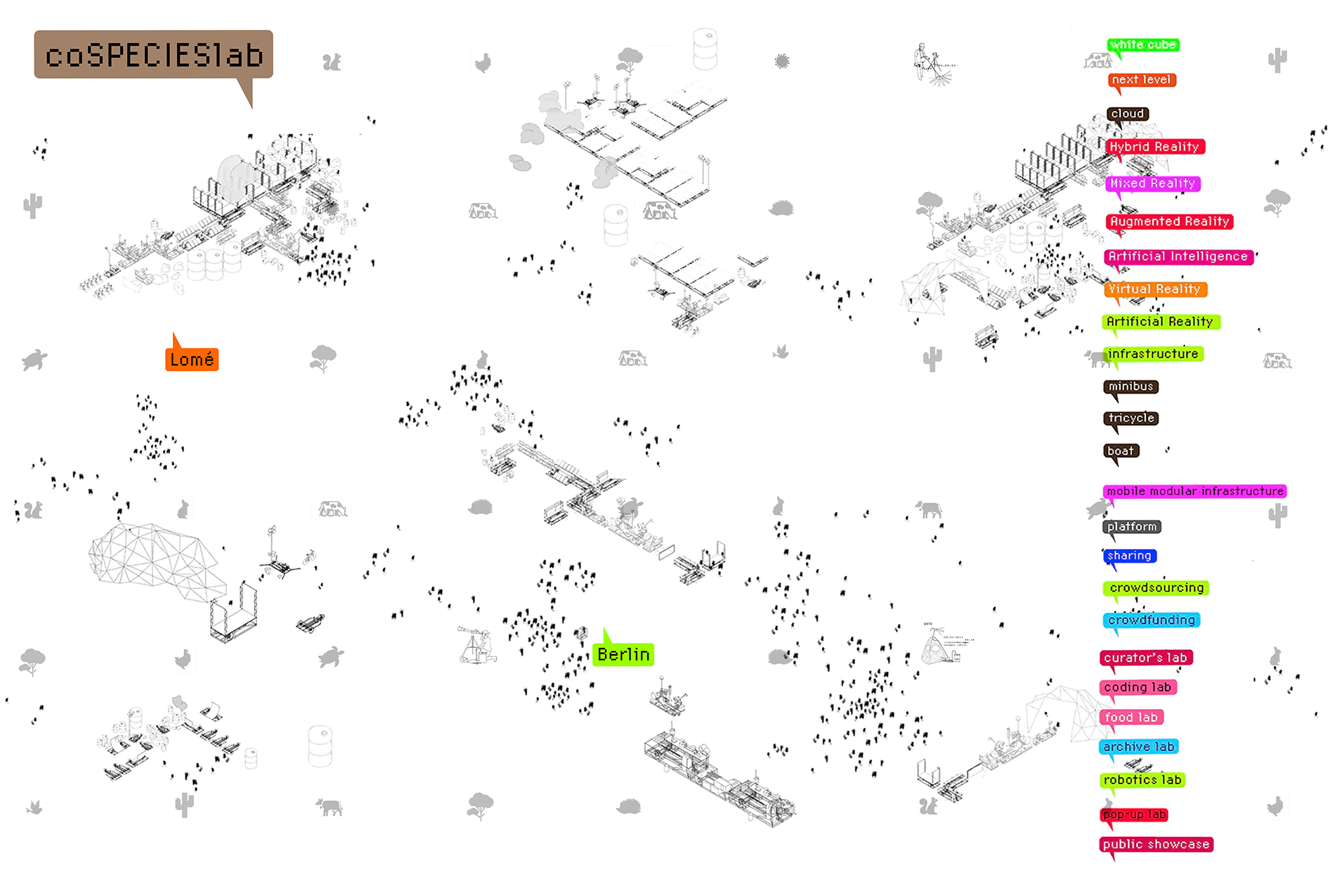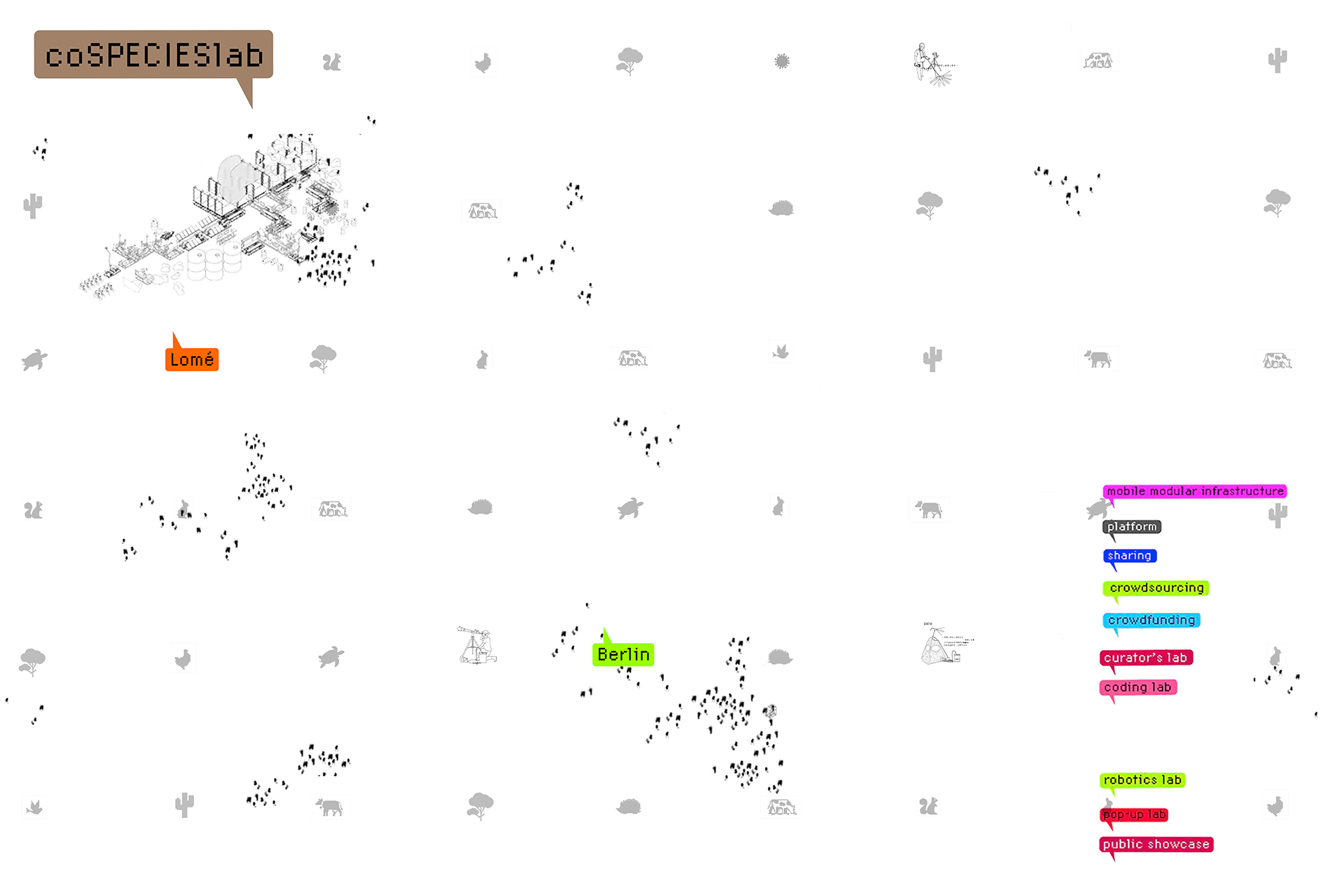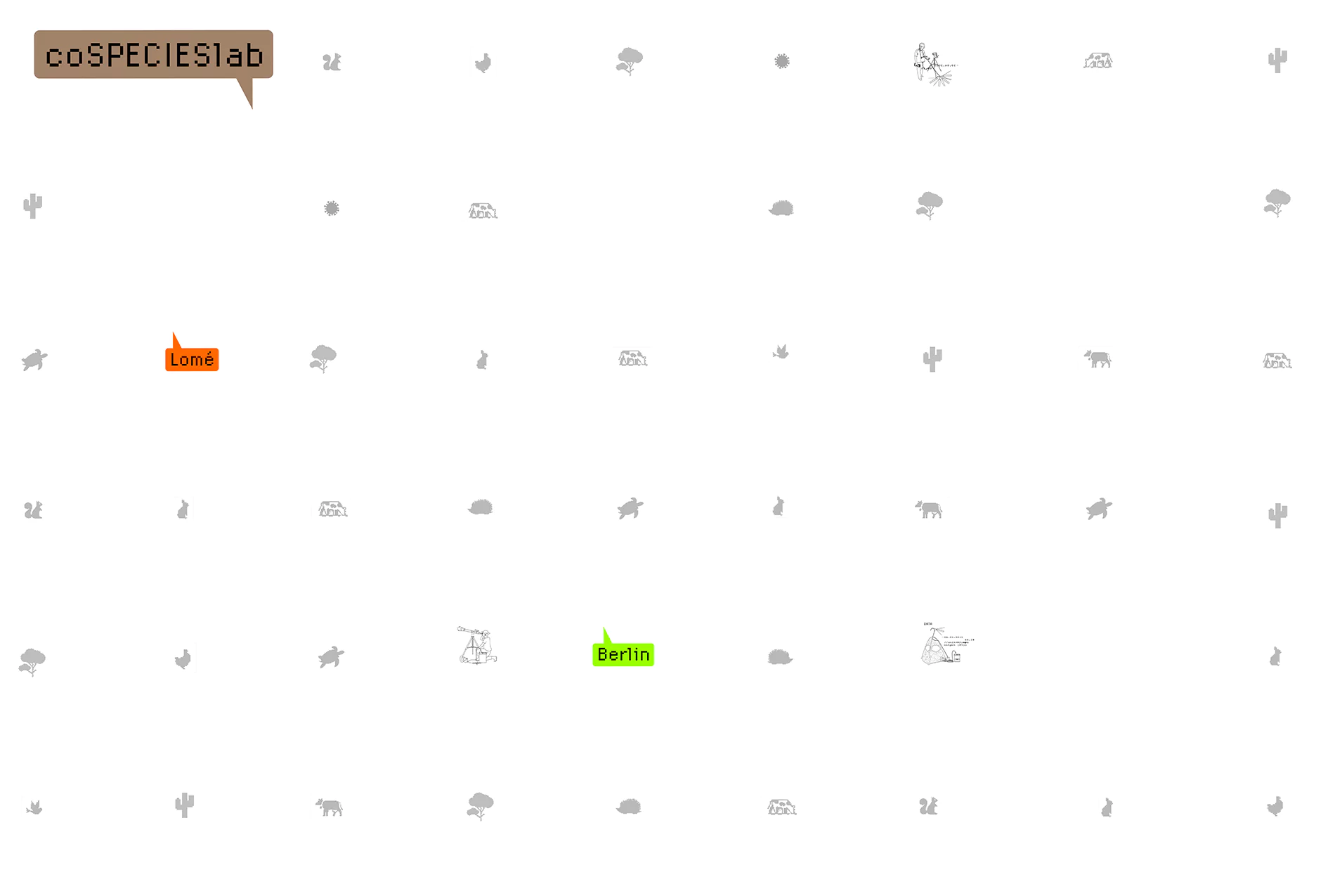Ecological transition implies and demands a conceptual mutation, a paradigm shift.
This has to integrate also other ways of conceiving the world, some of which are still organizing the daily lives of the inhabitants of cities in the Global South, and are often shunned and disregarded in the Global North.
The international nomadic translocal R&D program promotes sustainable urban cohabitation practices.
Hybrid workshops, bringing together remote-connected international experts and local actors in Accra, Athens, Dhaka, Djerba, Karachi, Lima, Lomé and San Francisco, develop bottom-up, open-source digital solutions, incorporating local perspectives into the digital transformation of multispecies cities.
Festival #1 Multi Species Habitat @ WɔɛLab, Lomé, Togo, 27 November 2023
Exploring a non-Anthropocentric Urbanity
Ecological transition implies and demands a conceptual mutation, a paradigm shift. This global challenge has to integrate also other systems of knowledge and ways of conceiving the world, some of which are still organizing the daily lives of the inhabitants of cities in the Global South, and are often shunned and disregarded in the Global North.
coSPECIESlab aims at integrating world views that are more deeply and meaningfully concerned with interspecies relations and the balance with nature. Such approaches become increasingly relevant as we are confronted with the pressing urgency of urban climate adaptation and biodiversity loss. coSPECIESlab also invites and assists local citizens in taking the digital future of their multi-species city into their own hands.
The coSPECIESlab develops a series of mini-festivals, the coSPECIESfests, involving the neighborhood at different international locations, taking off first in Africa, Europe and global. The coSPECIESfests embrace the evolution of new paradigms by adopting a locally embedded and nomadic approach, culminating in the formation of the transcontinental decentralized think-and-do tank coSPECIESlab! This long-term laboratory is committed to investigating and developing sustainable cohabitation practices.
The mini-festival series starts in Lomé, Togo, and in the form of a ‘relay race’ – with its own ripple effects and echoes – informs subsequent labs and mini-festivals in other cities in Africa and globally.

coSPECIESfest mini-festivals communicate complex sustainable issues in an attractive and playful way. Telling powerful stories about the impact of human life on our planet and promoting an understanding of the challenges of environmental and climate change, open new spaces of possibility, developing new perspectives, approaches as well as practices and tools that contribute to a more sustainable world.
Tapping into the power of imagination and fostering bottom-up innovations by local communities, the program supports the digital transformation to work toward a healthier and more equitable future that preserves nature rather than exploits it. The mini-festivals program promotes digitally supported participatory processes to co-create new narratives for the Anthropocene as well as to encode a new relationship with (urban) nature.
The program starts with the first coSPECIESfest mini-festival in Lomé in 2023, to then develop – together with international partners (a.o. in Africa and Europe) into the transcontinental coSPECIESlab network
The program considers the urban environment as a multi-species habitat, as an ecosystem of coexistence and focusses on the interdependence of people, animals, and plants. It aims at overcoming an anthropocentrism that is very much rooted in contemporary Western practices and that places humans at the centre of the universe – resulting into nature being subjugated to such an extent that human and other-than-human life is threatened today.
The program also taps into the richness of rural sustainable practices and their inherent circuits of circularity, accelerating these pre-urban traditions into the Digital and Urban Age. The wisdom of such vernacular sustainable life is precious for the transition to a lifestyle “within the planetary boundaries”.

The mini-scale of the festival cherishes the small-scale of the neighbourhood, corresponding to contemporary urban planning paradigms such as the “City of Short Distances” (“Stadt der kurzen Wege”) and the “15-Minute City”, increasingly relevant for the transition to sustainable and healthy lifestyles, settlements, and communities.
A sustainable future has to be increasingly local, with strong cultural ties to the social environment in the immediate neighbourhood. The program nurtures hybrid (combined physical and digital) trans-local community spaces that support exchanges across localities, with people engaging in conversation across distances. Connecting local physical spaces and their challenges together with global discourses strengthens a “planetary thinking”: think global, act local!
With a problem-oriented approach to the urbanization of digital technology, the program addresses the question of how we want to live together, and, crucially, how we want to shape together the cities we live in. The project’s bottom-up method to develop open-source digital tools, aims at incorporating local perspectives and experiences into the digital transformation of the city. All the while, the project breaks through a technological determinism, the attitude that places efficiency (as the inherent logic of technology) above the development of social structures and cultural values.
The current ecological transition implies a conceptual mutation, a paradigm shift. If it is to succeed, it has to integrate other epistems, other ways of conceiving the world that are neither extractivist nor Promethean, some of which are still organizing the daily lives of the inhabitants of African cities.
coSPECIESlab therefore curates and organises a series of coSPECIESfest mini-festivals reaching towards the emergence of such new Afro-global paradigms.
As Africa is a continent of accelerating urbanisation, the program strengthens alternative perspectives from the Global South, focusing on existing problems of the city dwellers and committing to the goals of sustainable urban development and to human-nature coexistence.
In terms of survival, recent history shows that the rapid and chaotic development of emerging cities in the Global South have maintained practices that provide local responses relevant to global challenges, particularly with regard to the cohabitation of species, blurring the boundaries between urbanity and rurality. These solutions address concrete problems that reactivate narratives that do not pit culture against nature, in which humans are made of the same wood as their environment, and which rightly reaffirm the interdependence of humans, animals and plants. Such “rurban” practices being still alive in Lomé, Lomé‘s WɔɛLab is the starting point of the festivals’ relay race.
With an urbanization rate expected to rise from 39% in 2014 to 58% by 2050, i.e., from 2.7 million in 2014 to 8.4 million in 2050, Lomé in Togo, West Africa, has for the most part managed to preserve certain so-called traditional modes of organization, while showing itself capable of projecting itself directly into the Digital Age.
Since HubCity with its WoeLab(s) have been championing an avant-garde approach that explores the aforementioned challenges, Lomé will be the first the playground and starting point of the mini-festival relay race. Conceived in stages, the mini-festival project therefore kicks off in Lomé – to then echo and expand into a series of mini-festivals in other African cities, in Berlin and Paris and beyond.
Revaluing vernacular city practices and conceptions of the world scorned by colonial logic, the primitive taking the place of the post-modern, yesterday’s colonized now teaching their methods to yesterday’s dominants, the coSPECIESfest-series is learning from Lomé.

The mini-festival aims to highlight initiatives that integrate the human world with the non-human world of animals and plants. Based on the principle that the urban environment is a multi-species habitat, an ecosystem based on the interdependence of people, animals and plants, the mini-festival program solicits expression in all forms and formats as long as they deal with the collaboration and coexistence of species in the urban environment: local initiatives, workshops, artistic projects, conferences, interventions, itineraries, applications, various restitutions…
The coSPECIESfest in Lomé integrates less anthropocentric visions of the world, more concerned with inter-species relations and balance with nature. Such cultural paradigms are regaining relevance as we face the urgency of biodiversity loss and the search for alternative models.
The program raises awareness of other knowledge systems, highlighting other micro-political organizations and collective conceptions in resonance with the question of the city understood as a mosaic of local initiatives, from the angle of the human/non-human relationship. The mini-festival focusses therefore on the small scale of the neighborhood and on micro-local proposals, highlighting a community’ ethos based on a specific conception of living-together.
The first coSPECIESfest takes place in the HubCity territory in a one-kilometer radius around “WɔɛLab Prime” in Lomé, Togo.
Organized into 3 workshops, each dealing with a different dimension of the human-nature relationship, the mini-festival will bring together over 3 days the bearers of various local, regional and international initiatives, in response to the present call.
The coSPECIESfest #1 program aims at “learning from Lomé” by highlighting the diversity of rural practices and drawing inspiration from their circular functioning, and which are for some still alive in the heart of Lomé, while accelerating the transition of these rurban societies to the Digital Age where they could benefit most. As the intelligence of such vernacular concepts is very valuable to the general transition to a sustainable way of life, they should set an example, informing the upcoming coSPECIESfest events as well as the coSPECIESlab.

The project is developed by L’Africaine d’architecture (Lomé, Togo) and Hybrid Space Lab (Berlin, Germany) tandem, with CURIO promoting it in the French-speaking research community and landscape.
L’Africaine d’architecture was created in 2011 to anticipate the future challenges of the African city and address them through the development of alternative concepts for responsible urbanization. The association’s efforts are aimed at developing experimental and applied forms of such alternative concepts in order to envision and build new institutions.
Hubcity and its WoeLab(s) as “Spaces of Technological Democracy” constitute a unique network of popular innovation spaces which aims to promote the conceptualization of an alternative Smart City based on innovative and frugal solutions. Dedicated to learning and emulation around new technologies, at the service of city dwellers, notably through the use of digital commons, this place has evolved over time into a Digital Resource Center and StartUp incubator.
Architect and anthropologist Sénamé Koffi Agbodjinou is founder of L’Africaine d’architecture and of HubCity and of WoeLabs, a network of Togolese tech-hubs that aim to ‘make everyone equal in the face of the digital revolution’. In his work, he develops alternative visions on the issues of integrated architecture, primitive computationalities, technological democracy and sustainable cities.
CURIO ouvroir d’anthropologie potentielle is an independent research space and non-profit association founded in the Paris region, France, in 1996, developing cultural projects with a high anthropological coefficient, whilst grounding its research in questions people are asking on the field, instead from academic issues. At its core, CURIO strives to democratize and liberate research methodologies from traditional institutional frameworks.
CURIO’s general aim is to promote ways of producing knowledge, by supporting their formulation, through programs that extend – but do not exclude – the contributions of the human sciences, in particular anthropology, outside the academy: specific research, educational formats, artistic interventions, exhibitions, publications, theatrical productions and various workshops.
With a logic of de-compartmentalization, CURIO’s projects are situated at the interface between individuals, associations, collectives (artistic, activist, etc.) and public research institutions. Each of its programs or projects, called “Ouvroir d’anthropologie potentielle”, is based on an approach that reveals other ways of doing, thinking and being human.
CURIO is founded by Dr. Bernard Müller a Franco-German researcher/lecturer in social anthropology and scientific-cultural program designer that spent his childhood in Togo.
Hybrid Space Lab is a Think Tank and Design Lab for architecture, urbanism, design and digital culture.
Hybrid Space Lab focusses on cultural innovation and is a cultural breeding ground for incubating breakthrough concepts and fostering innovation contributing to positive societal and environmental change. “Hybrid” stands for interdisciplinarity, “Space” for expertise, and “Lab” for an innovative working method, which prefers a transdisciplinary design approach, where city, nature and the digital are addressed and developed together in an integrated way.
Founded by Prof. Elizabeth Sikiaridi and Prof. Frans Vogelaar, Hybrid Space Lab is based in Berlin and works broadly internationally. Prof. Elizabeth Sikiaridi has lectured since 1997 on design in the urban landscape at the University of Duisburg-Essen and at the Technical University of Applied Sciences and Arts OWL where she heads the international master’s program “Sustainable Landscape Design and Development”.
Born in the Netherlands and growing up in Zimbabwe, Prof. Frans Vogelaar founded in 1998 the first Department of Hybrid Space worldwide at the Academy of Media Arts in Cologne, Germany.
Prof. Elizabeth Sikiaridi has lectured since 1997 on design in the urban landscape at the University of Duisburg-Essen and at the Technical University of Applied Sciences and Arts OWL where she heads the international master’s program “Sustainable Landscape Design and Development”.
related PROJECTS